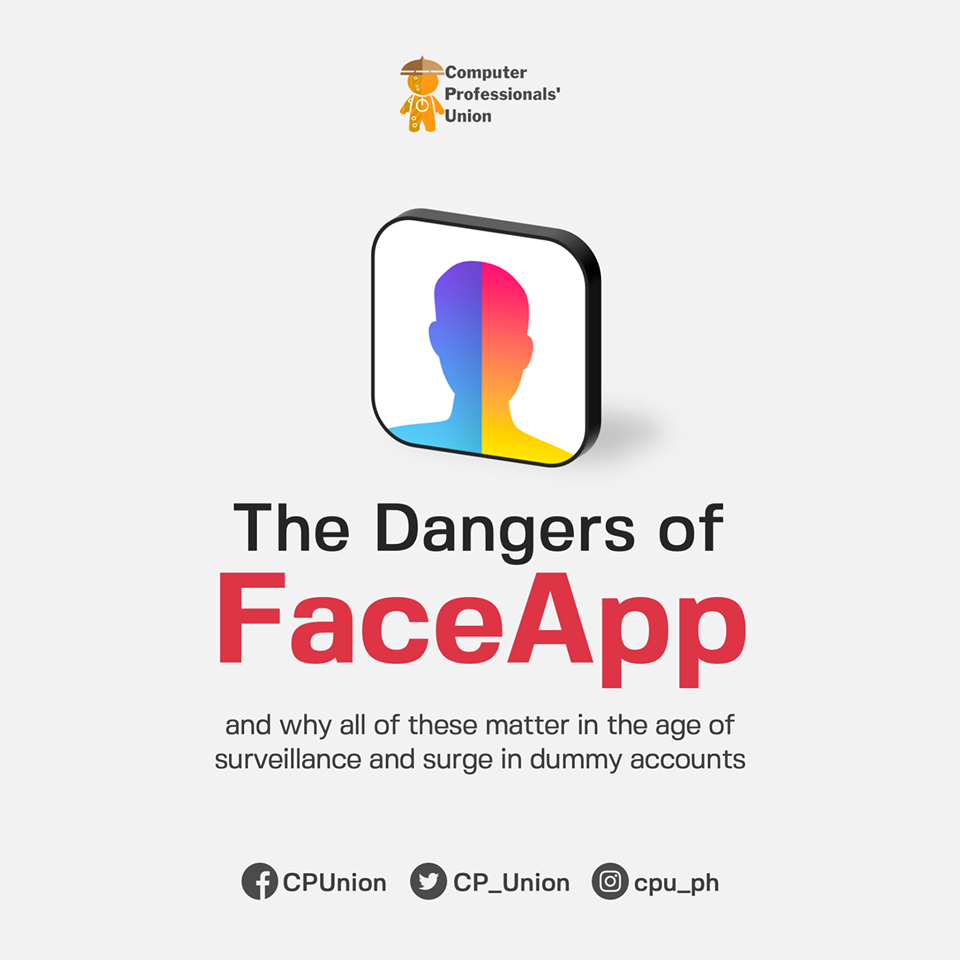By Rommel F. Lopez

A group of information and communications technology practitioners in the country is warning the public about using the popular image manipulation tool, FaceApp, saying users unknowingly grant the app permission to use your image for a lot of purposes which may include using a person’s digital likeness for illegal activities ranging from black propaganda to identity theft.
The Computer Professionals’ Union (CPU) said in a statement that using FaceApp, an AI-based image manipulation tool that has recently regained popularity because of its capability to realistically transform a person’s image from one from masculine to feminine, and vice versa, pose security risks upon unknowing subscribers.
“While the idea of having an app that gender swaps humans in pictures does sound interesting and fun, it comes with several risks and dangers,” CPU said.
FaceApp, available for download iOS and Android phones, was developed by Russian Company Wireless Lab. It can generate highly realistic transformations of human faces from photographs uploaded by users by using neural networks based on artificial intelligence. It can transform a face to make it smile, look younger or older, or even change genders.
The CPU explained that FaceApp uses this neural network to use several human images collected from various sources to warp a person’s face.
However, CPU warned that upon close scrutiny of Section 4 of FaceApp’s terms of use, all app users grants FaceApp the “… a nonexclusive, royalty-free, worldwide, fully paid license to use, reproduce, modify, adapt, create derivative works from, distribute, perform and display your User Content during the term of this Agreement solely to provide you with the Services”.
CPU said that user content in this context refers to “… content, including photos, videos, messages, text, software and other materials” that were created, posted, shared, and stored using the app.
“By using this application, we grant FaceApp (and whoever they give access to their database) freedom to access our personal digital likeness and permission to use it for their purposes,” CPU warned
The non-stock, non profit organization said that even if the user is granting FaceApp access to use the images collected “… solely to provide you with the Services”, Section 10 of the same terms of use state that FaceApp does not “control, endorse or take responsibility for any User Content or third-party content available on or linked to by our Services”. CPU said this may include “unscrupulous individuals or parties that seek to use a person’s digital likeness for nefarious purposes from black propaganda to identity theft.”
“Be reminded that not too long ago, there have been very suspicious activities online including the proliferation of doppelgänger accounts on Facebook, which could possibly benefit from FaceApp data,” the CPU said referring to the spread of dummy accounts on Facebook recently.
The CPU added that with the pending signing of the Anti-Terrorism Bill into law by President Duterte, “there is danger that these doppelgänger accounts, coupled with realistic likeness of the persons they’re impersonating, could maliciously act in violation of the provisions of said law thereby framing the actual person.”
“We need to be cautious of the digital footprints and personal information that we provide various social media platforms and other types of services online. This applies not only to FaceApp, but also to other third party apps that mine our information. We must realize that giving the people and organizations behind them permission to gather and use our personal information means that we do pay for their services – not in cash but at the cost of our attention, privacy, and security.”
In December 2019, the United States’ Federal Bureau of Investigation (FBI) said FaceApp could pose a “potential counterintelligence threat”. FaceApp’s founder, Yaroslav Goncharov, assured the public in 2019 that user data and uploaded images were not being transferred to servers in Russia but instead on servers running in the Google Cloud Platform and Amazon Web Services.